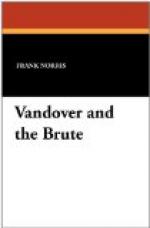Next, Vandover had tried to borrow some money of Charlie Geary. Geary had told him that he could not afford as much as Vandover needed. Then Vandover became enraged. He had long since seen that Geary had practically swindled him out of his block in the Mission, and at that very moment the huge boot and shoe “concern” was completing the factory built upon the ground that Vandover had once owned. Geary had cleared seven thousand dollars on his “deal.” His refusal to loan his old-time friend fifty dollars upon this occasion had exasperated Vandover out of all bounds. There was a scene. Vandover told Geary what he thought of his “deal” in very plain words. They shouted “swindler” and “gambler” into each other’s faces; the whole office was aroused; Vandover was ejected by force. On a stair landing half-way to the street he sat down and cried into his arms folded upon his knees. When he returned to his room he had a sudden return of his dreadful nervous malady and barked and whined under the bed.
Then Vandover wrote a fifty-dollar check on the bank—the same bank that had just notified him that he was overdrawn—and passed it upon young Haight. How he came to do the thing he could not tell; it might have been the influence of Geary’s successful robbery, or it might have been that he had at last lost all principle, all sense of honour and integrity. At any rate, he could not bring himself to feel very sorry. He knew that young Haight would not prosecute him for the dishonesty; he traded upon Haight’s magnanimity; he only felt glad that he had the fifty dollars. But by this time Vandover did not even wonder at his own baseness and degradation. A few years ago this would have been the case; now his character was so changed that the theft seemed somehow consistent. He had destroyed young Haight’s friendship for him. He had cast from him his college chum, his best friend, but neither did this affect him. Nothing made much difference to him now.
Nevertheless, Vandover was evicted from the Lick House three days after he had stolen young Haight’s money. Instead of paying his bills with the amount, he gambled it away in a back room of a new cafe on Market Street with Toby, the red-eyed waiter from the Imperial, and a certain German “professor,” a billiard marker, who wore a waistcoat figured with little designs of the Eiffel Tower, and who was a third owner in a trotting mare named Tomato Ketchup.
Vandover was now left with only his bonds, his U.S. 4 per cents. These brought him in but sixty-nine dollars a quarter, or as he had had it arranged, twenty-three dollars a month. Just at this time, as if by a miracle, a veritable God from the Machine, Vandover’s lawyer, Mr. Field, found him an opportunity to earn some money. For the first and only time in his life Vandover knew what it was to work for a living. The work that Field secured for him was the work of painting those little pictures on the lacquered surface




